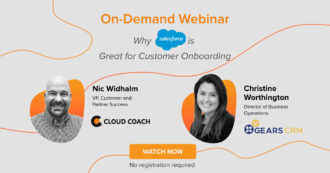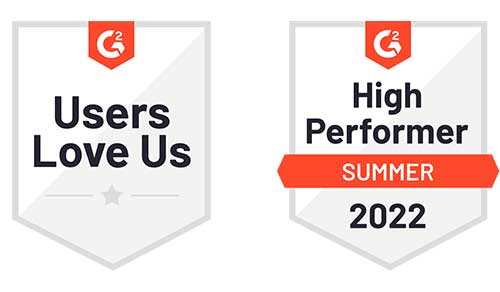 Webinar
Webinar
- Solutions
- Customer Onboarding
- Customer Success
- Professional Services Automation
- Project Management
- Project Portfolio Management
-
Solutions
-
Features
- Why Cloud Coach
- Customers
-
Resources

There are so many metrics that organizations can use to measure their success and track progress towards their goals. The ability to identify and analyze your most crucial data can help you spot opportunities for improvement, outshine your competition, and grow your business.
Almost all your business activity can be measured, from website visits to customer conversions to annual profits. But one of the most important benchmarks for any customer-facing business is the net promoter score, or NPS.
You’ve no doubt heard the aphorism that the customer is always right. Well, there is some truth to that. Customers are the cornerstone of any business, and if they are dissatisfied with your product or service, they will have no qualms about switching to one of your competitors. Being able to put an exact figure on their satisfaction and loyalty is invaluable for any business owner, and can help you retain and attract customers to ensure long term growth.
The swallowing article takes a look at the importance of net promoter scores for business, outlining the score you should be aiming for and how to achieve it. This information will help you to improve customer satisfaction and loyalty, which will have a direct impact on your bottom line.
Read on to learn more.
What is a net promoter score (NPS)?
Your net promoter score is a metric for measuring customer experience. When a B2B customer has used your product or service, it is good practice to get some feedback. This helps you to identify what you are doing right, and where you could improve. This feedback usually takes the form of a customer satisfaction survey, in which the client rates your service by how likely they would be to recommend your brand to another individual or organization. The scale goes from one (Not At All Likely) to ten (Extremely Likely).
An NPS survey can be either relational or transactional. A relational survey might be sent out to customers annually or quarterly, and ask them to provide their general feedback about your organization. It gives you a sense of how they feel about your company and helps you establish a relationship health check. A transaction survey, on the other hand, relates to specific interactions between you and the client. For example, they might fill in a survey after using your website or receiving telephone support. This helps you understand customer satisfaction on a more granular level.
It’s important to note that the net promoter score can be used to measure anything. As well as being a metric for a customer’s overall experience of your business, it can be used with a more specific focus. You can obtain an NPS for individual products, members of your team, or web pages on your site.
The NPS metric has transformed the business world, and is now a standard practice when it comes to measuring and quantifying the customer experience.
ADDITIONAL LINKS
Why do net promoter scores (NPS) matter?
Knowing your net promoter scores can have a hugely positive impact on your business, both immediately and in the long term. A high score indicates that you have a healthy relationship with your customers, who are more likely to act as evangelists for your brand and recommend you to other potential clients in your target demographic. This fuels a positive growth cycle and helps you towards achieving your long term goals.
It might seem that a simple score from one to ten is too simple to provide any meaningful insight, but there are also opportunities to obtain more useful information. When a customer fills out the survey, you can then use follow-up questions to ask them why they selected a particular score. You can drill down into their perception of your organization and work out exactly why you are falling behind in one area, or where you are making a positive impact and should continue to focus your efforts.
You can also track and quantify your score over time, thereby creating internal benchmarks that your organization can all aim for. Knowing your NPS score in different areas gives you a meaningful target to aim for, and helps you to improve in all aspects of your business.
How do you calculate a net promoter score?
Your net promoter score is relatively easy to calculate and will result in a figure between -100 and 100. All you need to do to work it out is subtract the percentage of detractors from the percentage of promoters to reveal your score. The formula for this calculation is as follows:
NPS = %Promoters – %Detractors
In order to understand this formula, it is necessary to elucidate how customers who respond to the survey are categorized into three groups – promoters, detractors, and passives – depending on how they answer the question.
Promoters: Those customers who have scored your company a 9 or a 10 on the NPS scale. These are your most loyal and enthusiastic customers who have had positive experiences with your brand and are most likely to recommend you to others. They will keep coming back to you and will help to fuel your long term growth.
Detractors: One who has scored you 6 or lower. They have had a negative experience with your brand and are unlikely to remain as customers. In the worst case scenario, they may actively damage your business’s reputation by spreading negativity.
Passives: Anyone who has scored a 7 or 8 is regarded as passive, and their answers are not included in the final score. They may or may not use your company again, but are unlikely to have much of a positive or negative impact on your reputation. However, they are not to be ignored. Since they are very close to swinging either way on the scale, it is worth following up to see what you could do to make their experience more positive.
As an example, let’s say you send a satisfaction survey to 100 customers. Of this number, 81 score you positively, 5 submit a passive score, and the remaining 14 are negative. Using the formula shown above, subtracting 14 from 81 gives you an overall net promoter score of 67.
What is a good net promoter score?
Now that you know your net promoter score, how can you identify whether it is good or bad? Your NPS could fall within a wide range, from -100 at the very bottom to an amazing 100 if you have a universally positive response.
Anything above zero can be considered good, since it indicates that you have more promoters than detractors. On the other hand, a score below zero shows that the majority of your customers have had a negative experience with your brand.
It goes without saying that you should be aiming for as high a score as possible, with a perfect 100 being the ultimate goal. However, this is difficult to achieve as it requires every single one of your customers to score you a 9 or 10 in the satisfaction survey.
Determining whether or not you have a good score is difficult, since it varies from industry to industry. Some will have higher benchmarks than others, so it’s important to look at your competitors and see where you stand in relation.
Your score is a fluid figure, which will change every time you send out a new net promoter score survey. For this reason, it’s incredibly important that you pay attention to the data and keep striving to make improvements in response to the results. Keep doing the things that receive positive feedback and work on the areas that need improvement.
Typical benchmarks for the net promoter score
If you’re aiming for an NPS score of 100, you might need to set your expectations a little lower. No company has ever achieved a perfect score. And there will always be people who are indifferent or mildly negative towards a business. Perhaps they were unhappy with the cost or the product or service they received did not precisely line up with their expectations. These things happen, but it’s important you focus on improving and maintaining your high score.
It is generally accepted that a score over 70 is a good target to aim for. You might think that all the huge global behemoths would sit comfortably in this region but that’s not always the case. In 2022, Amazon had an NPS of 64, while Google had a score of 47. The highest scores in 2022 were Princeton Mortgage with 98 and Tesla with 97.
Do net promoter score benchmarks differ by industry?
Before you start comparing your score to the frontrunners, it’s important to note that benchmarks differ significantly from industry to industry. A score that is acceptable in one type of business may be well below average in another. The industry benchmarks are calculated by average the net promoter scores from business in a given industry. These benchmarks provide a great way to assess your own NPS relative to the rest of your industry. It helps you to see how you are doing compared to your competition and address any issues that may be preventing you from achieving a higher score.
Here are some of the B2B NPS benchmarks for globally leading industries in 2022:
- Consulting: 68
- Technology & Services: 61
- Digital Marketing Agency: 60
- Construction: 45
- Logistics & Transportation: 43
- B2B Software & SaaS: 40
- Cloud & Hosting: 25
What does a typical net promoter score survey look like?
A typical net promoter score survey will ask customers to rate their experience with your brand on a scale of one to ten. You can send this survey through a number of different channels.
For example, if a customer makes a purchase or takes any other action on your website, you can send them an on-page pop-up survey. This enables you to capture their thoughts and feedback while they are still active on your site. You might want this survey to appear on a thank you page after converting, or trigger it as a pop-up before they exit the site.
You would begin the survey by asking them how likely they are to recommend your brand on a scale of one to ten. And since they are interacting with your brand in real time, you can make your survey more dynamic by offering follow-up questions in response to their answer. If they are passive or a detractor, you could ask them what you could do to improve their experience. Or if they are a promoter you can ask about their reasons for giving this score. You may even want to include other optional questions for them to share additional ideas and suggestions.
Another method is to send an email survey to a customer after they have made a purchase or key interaction with your business. This requires more work on their part, as they have to click a link that will take them to a separate survey page. There will inevitably be a time delay between sending the survey and receiving the results. However, this could be a positive as they will have had more time to reflect on their purchase and will be able to give a more informed score.
Conclusion
In summary, it is clear that net promoter scores are a hugely important benchmark for any B2B organization. The score enables you to identify your business’s strengths and weaknesses, taking this actionable data and using it to help you achieve your long and short term objectives. The benchmarks enable you to establish your competitive position within your industry and allow you to measure and improve your customer experience and brand loyalty.
If you would like more information on improving your net promoter score and boosting customer satisfaction, get in touch today.
See Cloud Coach In Action
We’d be happy to provide a bespoke 1:1 demo on how Cloud Coach can benefit for your business.























